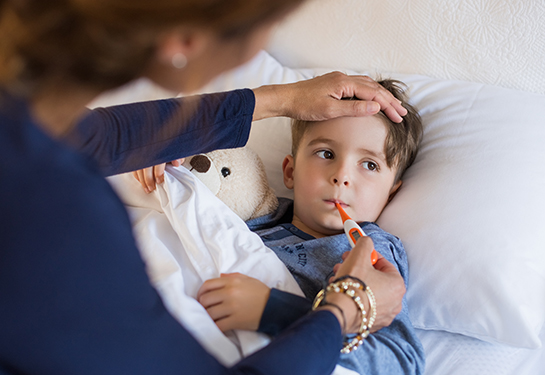These are the cold and flu symptoms parents need to watch for this winter
As the health care team at UC Davis Children’s Hospital prepares for flu, COVID, RSV and other respiratory viruses this winter, they have a message for families: Carefully consider what type of care your child needs. Pay attention to symptoms to tell when your child should be seen in the Emergency Department (ED), when you should contact their primary care physician or pediatrician and when you can take care of your child safely at home.
“There are a lot of respiratory viruses going around right now. The care for these viruses is generally the same: Hydration, nasal suction, rest and providing acetaminophen (Tylenol) for fever,” said Brenda Chagolla, associate chief nursing officer at UC Davis Children’s Hospital. “Consistent handwashing reduces the spread of respiratory viruses. Keeping children home from school and away from other children when they are sick will also protect others.”
When should children be seen in the ED?
Children should be seen in the ED immediately if they have these symptoms:
- Fast breathing (for infants younger than six months, this may be 60 to 80 times per minute)
- Pale or blue-tinged skin, lips or nails
- Severe coughing episodes, where they are struggling to catch their breath between episodes
- Severe sucking in at base of the throat or seeing the outline of ribs during breathing, flaring nostrils or grunting noise at the end of each breath
- Pauses in breathing more than a few seconds
- For infants, difficult breathing that is not improved after suctioning the nose
- Difficult to arouse, changes in mental status
- Fever of 100.4 degrees or higher in infants younger than two months
- Vomiting and dehydration (less than one urination every eight hours) and unable to rehydrate by drinking fluids
When should you contact your child’s pediatrician or primary care physician?
Contact your child’s pediatrician or primary care physician if your child is showing any of the following symptoms:
- Fast or labored breathing
- Fevers that are 100.4 degrees or higher, lasting for five days or more
- Persistent cough or wheezing, mild retractions (when ribs are pulling in with each breath)
- Decreased frequency of urination or decreased number of wet diapers
- More fussy and difficult to console
- You child has two symptoms happening at the same time such as ear pain/tugging and sore throat or abdominal pain and vomiting.
How should parents care for a child with respiratory symptoms at home?
- Viral illnesses cannot be treated with antibiotics.
- Treat your child with supportive care and encourage them to drink plenty of fluids. Honey can be a helpful natural cough suppressant but should only be offered to children over 1 year old.
- Suction your child’s nose if needed, with a bulb syringe or nasal aspirator (such as a NoseFrida), before they eat or sleep or when they seem to be breathing hard.
- Using saline drops in the nose with suctioning can help to remove mucous.
- Encourage your child to drink by offering small, frequent feedings.
- Give acetaminophen (Tylenol), as directed, or ibuprofen (if your child is older than six months of age) as needed for fever.
- For breastfeeding babies, continue to offer breast milk.
- Do not smoke around your child because secondhand smoke can cause infants and toddlers to develop lower respiratory tract illnesses.
How long will respiratory symptoms last?
- It is normal for fever to continue for several days, while the stuffy nose and cough can last one week and sometimes longer.
- Sleeping and eating routines may not return to normal for one week.
Resources
Seasonal vaccine update - influenza, covid and RSV (ucdavis.edu)
RSV--What's It All About? (ucdavis.edu)
American Academy of Pediatrics - RSV signs and symptoms video
HealthyChildren.Org- RSV

